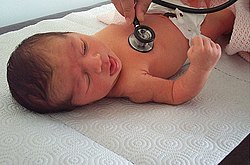 A pediatrician examines a neonate. | |
| Focus | Infants, Children, Adolescents, and Young Adults |
|---|---|
| Subdivisions | Paediatric cardiology, neonatology, critical care, pediatric oncology, hospital medicine, primary care, others (see below) |
| Significant diseases | Congenital diseases, Infectious diseases, Childhood cancer, Mental disorders |
| Significant tests | World Health Organization Child Growth Standards |
| Specialist | Pediatrician |
| Glossary | Glossary of medicine |
Pediatrics (American English) also spelled paediatrics (British English), is the branch of medicine that involves the medical care of infants, children, adolescents, and young adults. In the United Kingdom, pediatrics covers many of their youth until the age of 18.[1] The American Academy of Pediatrics recommends people seek pediatric care through the age of 21, but some pediatric subspecialists continue to care for adults up to 25.[2][3] Worldwide age limits of pediatrics have been trending upward year after year.[4] A medical doctor who specializes in this area is known as a pediatrician, or paediatrician. The word pediatrics and its cognates mean "healer of children", derived from the two Greek words: παῖς (pais "child") and ἰατρός (iatros "doctor, healer"). Pediatricians work in clinics, research centers, universities, general hospitals and children's hospitals, including those who practice pediatric subspecialties (e.g. neonatology requires resources available in a NICU).
- ^ "Paediatrics" (PDF). nhs.uk. Archived (PDF) from the original on 13 July 2020. Retrieved 2 July 2020.
- ^ "Choosing a Pediatrician for Your New Baby (for Parents) - Nemours KidsHealth". kidshealth.org. Archived from the original on 14 July 2020. Retrieved 13 July 2020.
- ^ "Age limits of pediatrics". Pediatrics. 81 (5): 736. May 1988. doi:10.1542/peds.81.5.736. PMID 3357740. S2CID 245164191. Archived from the original on 19 April 2017. Retrieved 18 April 2017.
- ^ Sawyer, Susan M.; McNeil, Robyn; Francis, Kate L.; Matskarofski, Juliet Z.; Patton, George C.; Bhutta, Zulfiqar A.; Esangbedo, Dorothy O.; Klein, Jonathan D. (1 November 2019). "The age of paediatrics". The Lancet Child & Adolescent Health. 3 (11): 822–830. doi:10.1016/S2352-4642(19)30266-4. ISSN 2352-4642. PMID 31542355. S2CID 202732818.